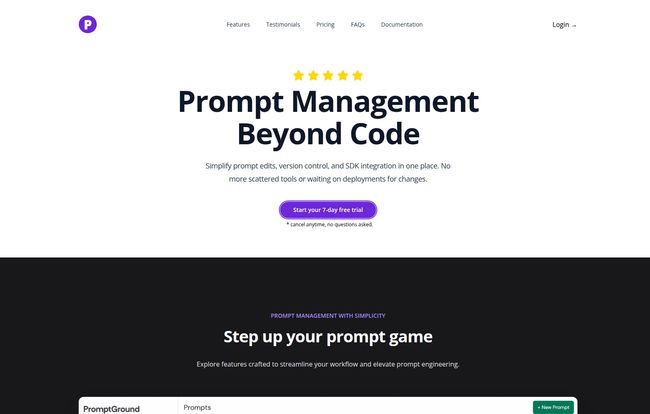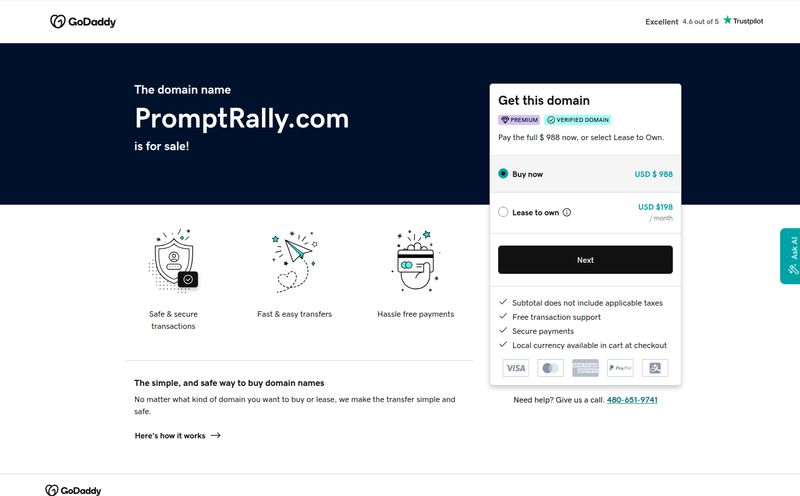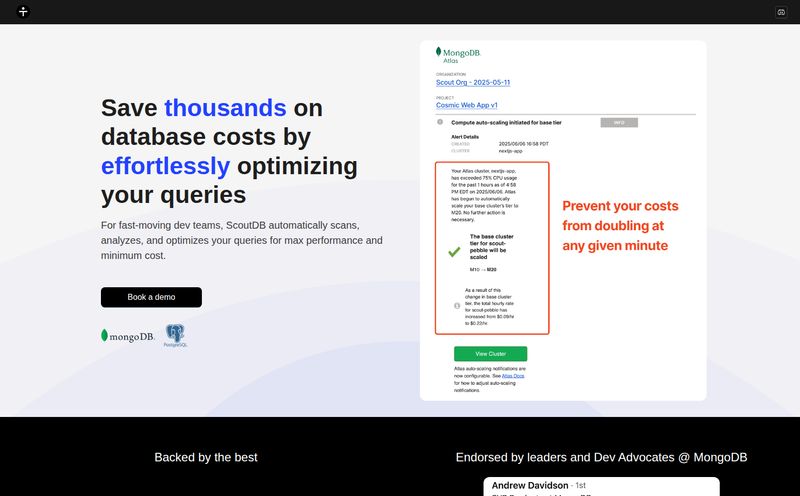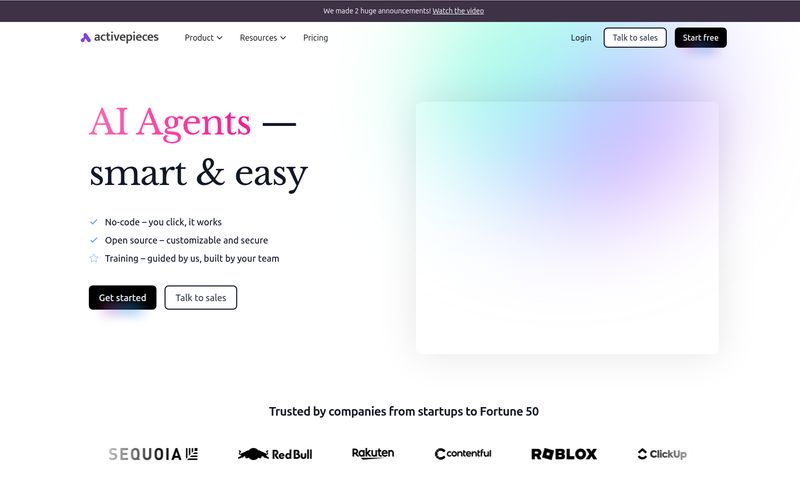If you've been working with AI models for more than, say, a week, you've probably felt it. That creeping sense of dread. Your beautiful, clean codebase starts getting cluttered with massive, ugly string variables. You know the ones. The FINAL_PROMPT_V3_for_real_this_time variables. Tweaking a single word in a prompt means a whole new git commit, a pull request, and maybe even a full deployment. It's a nightmare.
It's like trying to cook a gourmet meal, but all your ingredients are nailed to the wall. You can't just grab the salt; you have to get a crowbar and pry it off first. It’s slow, it’s messy, and it completely kills the creative flow of prompt engineering. For years, we've just… accepted this. A necessary evil in the brave new world of AI development. But what if it didn't have to be?
I recently stumbled upon a tool called PromptGround, and honestly, it felt like someone finally built the thing I've been sketching on whiteboards for months. It promises to take prompt management out of your code and put it where it belongs: in a dedicated, collaborative, and version-controlled environment. So, is it just another tool in an already crowded space, or is it the real deal? Let's get into it.
So What Exactly is PromptGround?
Think of PromptGround as a Content Management System (CMS) for your AI's brain. Instead of hard-coding your prompts directly into your application, you manage them on the PromptGround platform. Your application then just calls an API to fetch the latest, greatest version of the prompt it needs. Simple, right?
This simple change has some pretty massive implications. Suddenly, your prompt engineer can iterate on prompts without ever touching the production code. Your marketing team could (with the right permissions) tweak the tone of a customer service bot. You can A/B test different prompts without a single deployment. You're decoupling the logic (your code) from the content (the prompt). It’s a beautifully simple idea, and I'm kind of mad I didn't build it first.

Visit PromptGround
Stepping Up Your Prompt Game: The Core Features
A great idea is nothing without solid execution. So, what’s actually under the hood? I spent some time kicking the tires, and a few things really stood out.
Taming the Chaos with Version Control and Organization
This is the big one for me. PromptGround gives you a clean, project-based structure to organize everything. But the real magic is the prompt versioning. Every time you save a change to a prompt, it creates a new version. You can see the history, see what changed, and most importantly, roll back if your brilliant new idea turns out to be… not so brilliant. We’ve all been there. It’s basically Git, but designed specifically for prompts. It's so intuitive, you'll wonder how you ever managed prompts with copy-paste and file naming conventions.
Making Prompts Dynamic and Smart
Static prompts are fine, but the real power comes from dynamic content. PromptGround lets you use customizable prompt variables. In the UI, you can define placeholders like {{customer_name}} or {{product_type}}. Then, when you call the prompt from your application via their SDK, you just pass in the values for those variables. This is huge for creating personalized user experiences without having to do a bunch of messy string formatting in your code. The prompt stays clean, the code stays clean. Everyone wins.
Collaboration Without the Headaches
If you work on a team, you know the pain of trying to collaborate on prompts via Slack threads and Google Docs. It’s a recipe for disaster. PromptGround offers a collaborative workspace where everyone can work together. Better yet, it has flexible role-based permissions. This means you can give your prompt engineer full editing rights, while maybe a product manager can only view and comment. It prevents accidental changes and keeps the integrity of your projects intact. It’s a small feature that speaks volumes about their understanding of real-world development team dynamics.
Does It Play Well with Others? Integration and SDKs
A tool like this is useless if it’s a pain to integrate. Thankfully, they seem to have nailed this. PromptGround provides SDKs for both Python and Node.js, which covers a huge chunk of the AI development landscape. From what I've seen in their documentation, integration looks pretty straightforward. You install the package, initialize it with your API key, and make a simple function call to fetch your prompt. Minimal disruption, maximum efficiency. That’s what we like to see.
Let's Talk Turkey: PromptGround's Pricing
Okay, this is often the part where a cool tool becomes… less cool. I was pleasantly surprised here. PromptGround has a “Universal Plan” that’s incredibly straightforward. It’s $4.99 per month, but that’s if you pay annually. It’s a “Grow as You Go” model.
What do you get for that fiver a month? Pretty much everything:
- Unlimited Projects
- Unlimited Prompts
- Unlimited Team Collaboration
- Prompt Versioning & Custom Variables
- Python & Node.js SDKs
- Email Support
That's it. No complicated tiers based on API calls or number of users. I find this refreshingly simple. They also offer a 7-day free trial with no credit card required, so you can actually try it before you buy. For larger companies, they do have enterprise plans available if you need more bespoke support or features.
The Good, The Not-So-Good, and The Honest Truth
No tool is perfect, right? After my review, I’ve got a pretty balanced picture. What I really love is the sheer simplification it brings. Taking prompts out of the codebase is a genuine game-changer for workflow and team productivity. The version control is a life-saver, and the easy integration means you can get up and running fast. It just feels… thoughtfully designed.
Now, for a few things to keep in mind. The platform offers Prompt Analytics and Insights, which is fantastic for understanding what's working. However, the website mentions this has “limited access” on the current plan. I'd love to see more clarity on what those limits are, as data-driven prompt improvement is a huge selling point. Also, like any powerful tool, there might be a bit of a learning curve to truly master all the features. It's not steep, but it's not a one-click-and-you're-done solution either. Lastly, support is currently email-only. For most, this is probably fine, but teams that need instant, live support for critical applications might need to consider their enterprise options.
So, Who Is This Really For?
Honestly, a surprisingly wide range of people.
- Solo Developers: Even on your own, decoupling prompts from your code is a massive win for sanity and organization.
- Startups and Small Teams: This is the sweet spot. It allows your team to move faster, collaborate more effectively, and maintain a clean, scalable codebase.
- Prompt Engineers: This is your playground. A dedicated space to experiment, version, and perfect your craft without bugging the dev team for every little change.
- Large Organizations: The role-based permissions and enterprise options make it a viable solution for maintaining control and consistency across multiple AI projects and teams.
Frequently Asked Questions
- Is PromptGround just for developers?
- Not at all! While it's built with developers and prompt engineers in mind, its collaborative features make it useful for product managers, copywriters, or anyone on a team who contributes to the AI's voice and responses.
- How hard is it to switch our existing project to PromptGround?
- The process seems designed to be low-impact. You'd install the SDK, and then go through your code, replacing your hardcoded prompts with an API call to PromptGround. The initial setup might take an afternoon, but it'll likely save you countless hours down the road.
- Can I test different prompt versions easily?
- Yes, this is a core strength. You can easily switch between versions in the platform. For A/B testing, you could set up two different prompts and have your application logic decide which one to call, allowing you to gather data on their performance.
- What happens if PromptGround's service goes down?
- This is a valid concern for any API-based service. It's a good practice to implement a fallback mechanism in your code. You could cache the last known good prompt locally or have a default, hardcoded prompt that your application uses if the API call fails.
- Is the $4.99 price per user?
- The website's pricing seems to be for the whole plan, which includes unlimited team collaboration. It doesn't appear to be a per-user price, which makes it incredibly affordable for teams.
My Final Verdict on PromptGround
So, is PromptGround worth it? In my opinion, absolutely. It's a focused tool that solves a very real, very annoying problem in a clean and elegant way. It's not trying to be an all-in-one AI platform; it does one thing—prompt management—and it does it really well.
It’s an investment in a better workflow. It’s about saving time, reducing frustration, and empowering your team to build better AI products faster. If the pain of managing prompts in your codebase has you pulling your hair out, you owe it to yourself to at least sign up for the free trial. You might just find the sanity you've been looking for.



